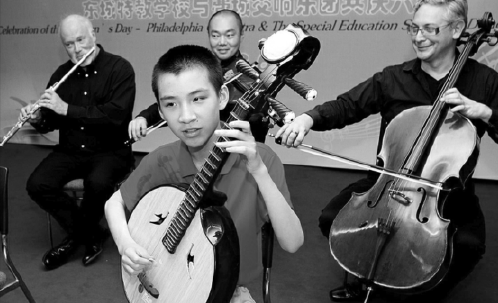
JIANG DONG/CHINA DAILY
Gao Yuxuan, a boy with autism, performs with musicians from the Philadelphia Orchestra during a celebration of International Children's Day in 2012.
Sound potential
Gao Tian, one of the first Chinese known to study music therapy abroad, founded the Institute of Music Therapy at the Central Conservatory of Music in 1996.
All individuals have the ability to respond to music and sound, he says, which can lead to positive changes in their behavior and emotional responses. More than 1,500 people have received music therapy training from Gao so far.
"Music has great positive effects for brain activity. It's not a medicine, which cures certain disease," says Gao, who graduated from Temple University in the United States and received his MA degree in 1994. He says the main approaches use singing, instrument playing and language guidance, to encourage people to engage in spontaneous and creative musical activities. "With proper music therapy, people can relieve anxiety and control emotions."
Gao is planning to offer services for seniors in China since the country's aging population is growing rapidly. "It has been proved that music therapy can benefit the elderly with mental health needs, by reducing isolation, promoting memory and healing after stroke," he says.
Wang Chunhong, who has studied music therapy since 1987, says that one challenge is to raise awareness about its benefits and potential. A graduate from Beijing Dance Academy, Wang uses dance and music to treat her clients. More than 2,000 people with mental challenges came to her during the past 20 years.
Born into a family of doctors of traditional Chinese medicine, Wang founded an arts-rehabilitation center in 2000 and combines the theory of TCM with music therapy, an idea documented in the book Art Therapy in Asia in 2012.
Making subways serene
"Music therapy isn't anything new. It was even mentioned in traditional Chinese medicine books," Wang says. "It can be used widely in our daily lives, such as to help people quit smoking and improve sleeping quality."
Since Jan 7, the National Center for the Performing Arts has sponsored a music program in Beijing's subway stations. Classical music is played at five different time periods every day, between 5:30 am and 10:30 pm. The music reaches a total of 160 stations on 10 lines.
Wang Chunqiang, an official with the Beijing Municipal Commission of Transport, was quoted saying that "music creates a good environment for passengers and relieves their anxiety."
Cui Yong, who is also the board chairman of the Chinese Music Therapy Association, says that at first music therapy in China was limited to playing music to patients.
"Now we have a broader vision thanks to some professional music therapists, like professor Gao, who has brought the modern theory and methods to China during the past two decades," he says.
He also says that the practice should be standardized in China. With nearly 300 registered members, who are mostly working in the music therapy-related fields, he says that the association plans to map out a professional certification system.
"Some people learn music therapy from some private training organizations, which are not professional and cannot meet the needs of the patients," Cui says. "Music therapy is still at the beginning stage in China, and it takes time for it to develop and become mature."
We recommend:
